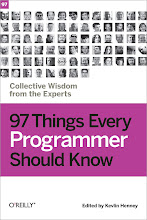Another great way to keep up your technical skills is to lead a certification study group. They say that the best way to learn something is to teach it. While that may be true, I can tell you that you don’t have to teach. I’ve recently found that leading a study group grants many of the same benefits while giving you an out. Since you’re just leading the group, and not actually teaching the topic, you don’t have to be an expert.
Even better, if someone in the group really is an expert on part of the topic, or just knows more about it than you do, you can defer to their expertise without losing credibility. And, that’s a win for everybody. (On the other hand, when I lead a group, I think it is important for me to know as much as possible about the topic so I can answer most of the questions they bring up.)
Certification itself seems to be a controversial topic, but I think that most people would agree that it is a way for interested people to learn more about a given topic. Personally, I think studying for certification is great because it forces me to learn about things I wouldn’t otherwise be too familiar with. For example, way back in 2001 I was studying for the Sun Certified Java Programmer (SCJP) exam (version 1.2 I think) so I had to become familiar with the Java IO classes. While they're useful for working with directories and files, I had no experience with them because at the time I was writing code that ran in an app server.
As I stated above I’m currently leading a study group and we're preparing for the SCJP exam for Java 6. While reading this week's chapter, I ran into something possibly useful and definitely interesting. Like the Java I/O classed in 2001, it's something new to me because I’m mostly writing JEE code and most JEE app servers don't support Java 6 yet. Sigh.
Anyway, we’re using Kathy Sierra and Bert Bates’ “Sun Certified Programmer for Java 6 Study Guide” as our text. It's an excellent book and since Kathy and Bert were instrumental in writing the exam, I figure that after working our way through it we should be covered. This week we’re on chapter 6 which is all about Strings, I/O, Formatting, and Parsing.
The I/O section introduces the java.io.Console class, which is new in Java 6 and lets you read from and write to the command line – if the environment you’re running in supports it. You write information to the console by calling format() and printf(), and you read from it using readLine() and readPassword(). The readLine() method is for retrieving a single line of text from the console. The readPassword() method also retrieves a line of text, but doesn’t echo it to the screen so your password isn’t displayed - which seems reasonable. So far so good, right?
Now comes the interesting bit. The readLine() method returns a String, but the readPassword() method returns a character array. After I read that, I looked up and wondered why the API wasn't consistent. It seemed to me that it would be better if both of them returned a String. Then my eye caught the next sentence and suddenly it all made sense.
Since readPassword() returns a character array, you can do whatever validation is necessary and then overwrite the data with something else to scrub the password from memory. So, why can’t you do the same thing with a String? Think about it for a bit before you read the next paragraph…
That’s right! In Java, Strings are immutable and they’re stored in a special memory pool so the JVM can reuse them; which means that if readPassword() returned a String then the confidential information you took pains to hide from prying eyes could be found by someone sifting through the system’s memory.
Of course, this also means that once you get the password you should take pains not to do anything that would create a String out of it; but you probably figured that out already.
If you're in a study group, or leading one, please leave a comment and let me know what you think about it. Is it valuable? Is it a waste of your time? And what do you think about Java certifications? Are they intrinsically valuable, or does it depend on circumstances?
Thanks for reading this. Y'all come back now, y'hear?
Don't Be Invisible!
-
Hacker News is a great source of information, and today they posted a great
article about not being invisible.
The core message of the article is to not ju...
13 years ago








